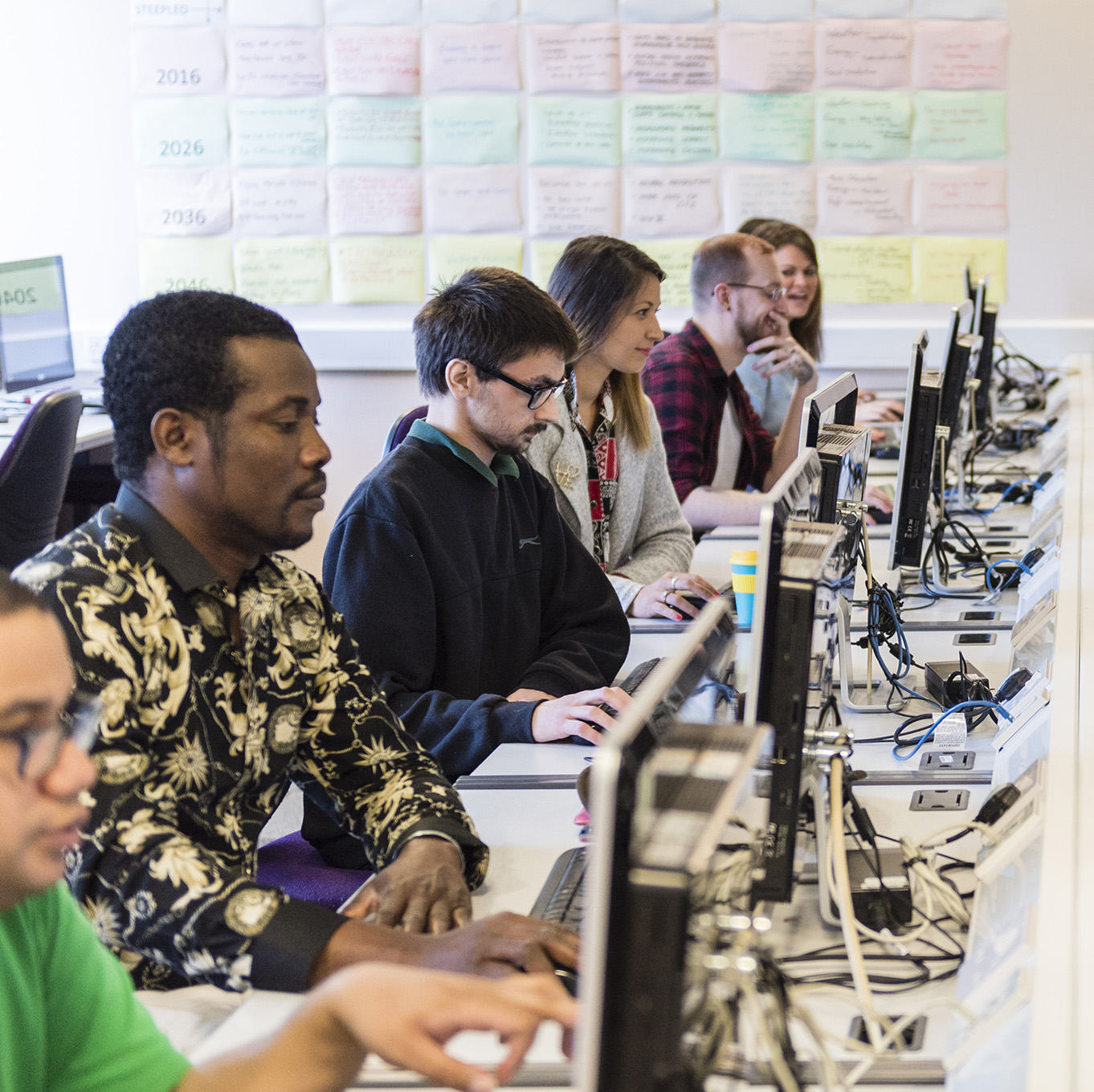BSc (Hons) Computer Science (with Foundation Year)

Course details
UCAS Code
I345
Year of entry
2024, 2025
Duration
4 YRS (FT)
UCAS Tariff
48-72
Institution Code
G53
Location
Wrexham
Course Highlights
Research active
department in future and emerging technologies.
Access
to a wide range of latest hardware and software.
Opportunity
to qualify for CISCO accreditation.
Why choose? this course?
Computer Science is an exciting and dynamic field at the cutting edge of technology, and this creative degree has the vision to provide professionals who can deliver. You will develop programming, data management, hardware and software skills to understand and develop solutions for today’s computer-dominated world.
This Computer Science degree programme will equip graduates with the knowledge, understanding and skills required to analyse, design, develop, test and maintain systems for the future. It also provides an opportunity to participate in the CISCO Academy Programmes in preparation for acquiring CISCO certified accreditation.
You will:
- Be studying a degree which has become part of everyday life.
- Benefit from industrial links the support the degree delivery in the form of guest speakers and placement opportunities.
- Explore the skills mentioned above as well as skills in programming, data management, hardware and software.

Computing atWrexham University
Thinking of a career in Computing? Hear from lecturers and students about our Computing course at Wrexham University.
Key course features
- The department has been successful in achieving funding for developing a range of intelligent kitchen appliances for use by elderly or disabled people and continues to develop research projects.
- This degree provides an opportunity to participate in the CISCO Academy Programmes and qualify for CISCO accreditation.
- Integrated into this degree is the opportunity to gain first-hand involvement with the workplace, by completing the Industrial Placement at level 5.
- Students undertake an individual project in the final year of their course. Normally each year, there are a number of ‘live’ projects available that involve working with businesses.
What you will study
YEAR 1 (FOUNDATION YEAR)
The foundation year provides students with the knowledge and confidence in the use of formula, data manipulation and representation. You will gain an understanding of the core hardware and software associated with the use of computer systems, as well as keeping up to date with current developments in technology. There will be numerous opportunities to work on practical activities such as robots, CAD design which will be further developed at degree level.
YEAR 2 (LEVEL 4)
Level 4 contains essential fundamental material which is relevant in all of our computing programmes. You will learn both subject-specific skills along with transferable skills which will increase your employability prospects.
With the support of your tutors, you will learn about some of the essential facts, concepts, principles and theories relating to computing and computer applications. You will be able to demonstrate skills that underpin good practice in the field of computers and computational methods, e.g. laboratory tasks involving the creation of simple programs and the use of operating systems.
This will help develop your understanding of hardware issues, including interfacing and data communications, and their impact on the overall design and performance of computer-based systems.
MODULES
- Fundamentals of Machine Learning
- Information Security and Governance
- Software Development Methodologies
- Applied Computational Methods
- Programming Fundamentals
- Computer Systems and Architecture
YEAR 3 (LEVEL 5)
Level 5 continues teaching you the fundamentals of the discipline, and more specialist modules start to be introduced. You will also undertake a group project where you will gain important skills in project management techniques and the professional and ethical issues of project management.
You will also deepen your knowledge and understanding of computing concepts and approaches for complex problems through the application of several existing artificial intelligence techniques for learning and optimisation targeting real-world problems.
MODULES
- Data Structures and Algorithms
- Secure Software Development
- Cloud, Distributed Architecture
- Machine Learning
- Systems Engineering and Project Management
- Group Project
YEAR 4 (LEVEL 6)
Once you reach your final year, you will further develop your skills through taught modules and research, with a focus on the latest developments in your chosen discipline.
You will also undertake an individual final year project, which will help prepare you for the kind of tasks and situations you may encounter in the workplace. The final year practical and project work will further develop your analytical skills through the analysis and appraisal of current and emerging technologies, taking into account their impact on society.
MODULES
- Deep Learning Implementation
- Cryptography and Defensive Systems
- Data Analysis and Visualisation
- Emergent Technologies
- Project
The information listed in this section is an overview of the academic content of the programme that will take the form of either core or option modules. Modules are designated as core or option in accordance with professional body requirements and internal academic framework review, so may be subject to change.
Entry requirements & applying
Our general requirement for the foundation year is 48-72 UCAS tariff points but all applications are considered individually and we consider work experience, vocational training/qualifications, as well as motivation and potential to succeed.
Applicants who do not meet the criteria above will be assessed on an individual basis by interview.
Teaching & Assessment
Teaching
The computing degree suite utilises a variety of industry-standard tools and software in combination with several teaching methods designed to deliver industry-relevant skills and empower students to take their work further where applicable. All Staff members have embraced the active learning framework (ALF) and there have been several enhancements to teaching and learning.
Assessment
The degree team take a balanced approach to assessment strategy with respect to group work and individual development opportunities. Extensive use of the JIRA project management cloud platform is used to track student progress towards goals and milestones. This has proven to be a beneficial tool with respect to personal development and critical time management skills.
Where applicable, assessments are linked to real-world projects or based on current industry trends and issues. In addition, project modules serve as a platform for enterprise activities.
Personalised Support
The Computing department at Wrexham University employs a long-standing open-door policy, and activate engage with students, alumni and industry using our online Discord community. Additional tools such as Teams and Moodle provide core information and methods of contact. All students are also allocated a personal tutor who are encouraged to meet on a regular basis and extra personalised support is provided for all part time students on VLE
Career prospects
A degree in Computer Science boasts opportunities for graduates. Jobs include, but not limited to:
- Application analyst/developer
- Machine learning engineer
- Software engineer
- System analyst
- Project manager
- Database Administrator
Our Careers & Employability service is there to help you make decisions and plan the next steps towards a bright future. From finding work or further study to working out your interests, skills and aspirations, they can provide you with the expert information, advice and guidance you need.
Our degree will enable you to work with large employers in software industries, in technology SMEs and help your career development towards managerial positions in software organisations or as a company director of your own business.
Fees & funding
You do not have to pay your tuition fees upfront.
The fees you pay and the support available will depend on a number of different factors. Full information can be found on our fees & finance pages. You will also find information about what your fees include in the fee FAQs.
All fees are subject to any changes in government policy, view our undergraduate fees.
Programme specification
Accommodation
If you’re looking for a place to stay while you study then take a look at our accommodation pages to get more information on your options, including our on-campus halls of residence Wrexham Village.
